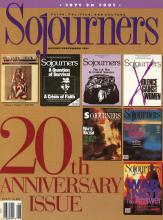In the last 20 years, the concept of human rights as a yardstick for U.S. diplomatic relations has gone in and out of favor. In the early 1970s, Richard Nixon and Henry Kissinger practiced a cynical realpolitik, on the one hand bombing Vietnamese and Cambodian peasants in the name of anticommunism and on the other opening doors to communist behemoths China and the Soviet Union. President Jimmy Carter made human rights his foreign policy linchpin, while Ronald Reagan made it his whipping boy.
George Bush has learned lessons from his predecessors. He speaks the language of human rights, while cozying up to some of the world's worst rights abusers when it fits his goals. Despots in Syria and Saudi Arabia become trusted coalition partners to wage war in the Gulf. Repressive regimes in South Korea and El Salvador are touted as cradles of democracy, receiving millions in American aid while muzzling, if not destroying, voices of opposition.
The most pointed example of Bush's hypocrisy around human rights was dramatized this spring when it came time to renew or revoke China's most-favored-nation (MFN) trade status. In a telling coincidence of timing, Bush's decision on the annual MFN renewal was by law due June 3 -- the day before the second anniversary of the brutal massacre in Tiananmen Square. At stake in the decision: billions of dollars worth of tariff exemptions for products from mainland China. Bush, a former envoy to the People's Republic, declared the Chinese favored for another year.
Read the Full Article
